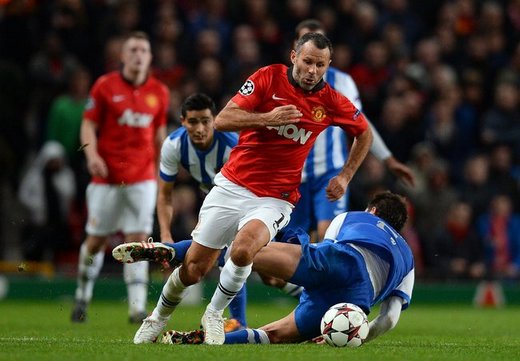News
At 40, Giggs Piles on the Responsibilities

LONDON — During this gray November, three extraordinary athletes have demonstrated that 40 is just an age and not necessarily an end to performing well in sports.
Sachin Tendulkar passed that milestone in April. He chose his own time and place to play his final test innings, on his home ground in Mumbai. He signed off by scoring a half-century more elegant than most men could ever emulate, and before he retired to the pavilion, a boy in the crowd held up a card that said: “Only humans will now play cricket.”
Tendulkar’s greatest gift was the act of timing. His second-greatest was a childlike ability to sustain enthusiasm for his game, year after year.
In soccer, we have not one, but two 40-year-olds still active at the highest level.
This month, we saluted Javier Zanetti, the Argentine defender who came back from a torn Achilles tendon. Zanetti never countenanced that he would play again for Inter Milan, and he does not believe that the minutes he enjoyed as a substitute at Livorno on Nov. 9 will be his last in the shirt.
Zanetti has put in the hard miles in training to make himself available at any time when the coach calls on his experience.
Tendulkar has left. Zanetti refuses to go. And Ryan Giggs can scarcely believe that anyone is even asking him to set a date for his retirement.
Giggs turns 40 on Friday, when he will report an hour or more before his Manchester United colleagues do because the Welshman now has extra responsibilities.
He is a player and a trainee coach, a member of the think tank planning the next match. But his priority, still, is to push his body as far as it can go.
There are no plans to celebrate the big 4-0. The Giggs family got that out of the way weeks ago. Friday is a working day, and he wants to play a part in Sunday’s Premier League contest at Tottenham Hotspur.
The manager, David Moyes, is the new boy around United. Moyes replaced Alex Ferguson, who had signed Giggs as a schoolboy, and Moyes asked Giggs to lend his unparalleled experience — he has won the English League 13 times — to the coaching staff.
One thinks of the words of the Roman poet Virgil. “Experto credite,” Virgil wrote. “Trust one who has done it.”
The player said, “Yes, boss.” But he begged to be allowed to fight for his place in the team at the same time.
“He’s a specimen,” Moyes told reporters. “Ryan is incredibly fit. Seeing him at close quarters, you marvel every day. You can imagine how good he must have been in his prime.”
His prime? Giggs hasn’t yet conceded that he is so far beyond that.
“I’m still enjoying training,” Giggs told Gary Neville, his former Manchester United colleague, on TV last week.
Neville, 15 months younger than Giggs, retired a year ago to work for Sky Television. When pushed about whether the mind or the body are becoming tired, Giggs sparred with his old pal.
“Now I’m a coach as well as a player,” Giggs said, “I think you’ve got to put our inconsistent start down to the players.” He laughed, and spoke about staff and players winning or losing together. And no, he did not yet feel his time was up. He will sign a contract to play at least one more year if he feels as he does today.
It is fashionable to discard experience in life, never mind in sports.
Giggs was United’s first-team left winger at 17, and the team now has Adnan Januzaj, 18, and Wilfried Zaha, 21, challenging to play on the wings where Ashley Young, Nani and Antonio Valencia are all established international performers.
Giggs, however, is more versatile than them all. If he has lost a yard of acceleration, and maybe his breathtaking change of pace with the ball in his stride, he has gained craftiness. He knows how to work through central midfield — to make the passes, to guide other players, to channel his experience garnered through 1,020 senior games for United or for Wales.
“Of course you have doubts,” he conceded to Neville. “You can have bad games at 19, or at 38, but you work harder to get over them.” Hard work, high ambition, an unrelenting thirst to play and an addiction to winning.
When you see Giggs glide with unimpaired balance and hear his determination not to give up until someone else makes him, you understand why Moyes marvels at him.
There is precedence in the English game. Stanley Matthews, the “wizard of the dribble” who played top-class soccer until he was 50, regretted having “retired too early, just because of a number.”
Matthews played from 1932 to 1965, a different era in a game played at a different tempo. But, like Giggs, he was a naturally gifted and slender athlete, fanatically dedicated to maintaining his fitness. And both were blessed not to suffer serious injuries.
They learned that the first yard of soccer is in the head. And that if you can see the moves before anyone else, you are halfway there.
Last Sunday, United played for the first time in Giggs’s lifetime in Cardiff. It is the city of his birth, though the family moved to the Manchester area when Ryan was 7 while his father played rugby league for Swinton. The toughness of rugby, which Giggs also tasted in his school days, prepared him for “the batterings” he encountered against soccer’s hard men later on.
Being the elder statesman, and player-coach, does not stop the United players from being cheeky about his age. “Where’s your walking stick?” they joked Sunday.
Some stick. He craved some action at Cardiff. His mother, grandparents, uncles and aunts were in the stands, their cheers drowned out by the booing of home-team fans the moment Giggs went on as a substitute with 20 minutes to play.
In those minutes, he produced two incisive passes that were beyond the imagination of the younger Manchester players in a hard fought match.
Experto credite.


